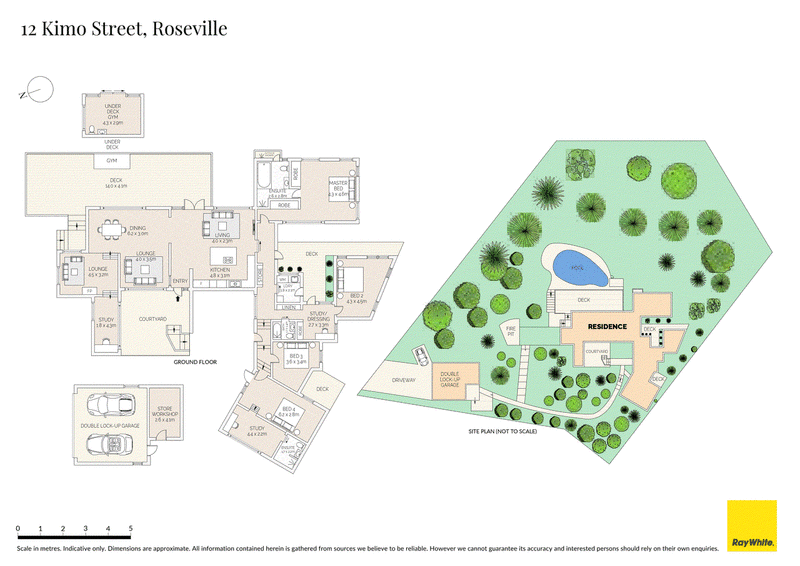Auction
Inspections
Auction
'Tourmaline,' built in 1959 and steeped in Australian history, was immaculately designed by renowned Sydney architect John James, designer of the significant modernist Reader's Digest building in Surry Hills. Embracing mid-century architectural elements and following recent sympathetic renovations," Tourmaline" is cradled by the surrounding bushland. The result culminates in a rare and breathtaking sense of privacy, promising a truly tranquil family oasis bordering Lane Cove National Park with Sugarbag Creek at its doorstep.
"It was my first house and project in Australia. Considered one of the first 'Sydney School' buildings, the house is open and I loved the way the ceiling and floor flowed throughout. I also cherished the hidden views - there are many to discover." - John James
John James' creations draw inspiration from their environment, seamlessly blending iconic Australian landscapes with innovative design, and this home is no exception. It is wrapped in glass, allowing for an abundance of natural light and a relaxed ambience, whilst birdsong echoes across three very private residential wings, each brimming with its own personality and custom quality mid-century finishes. The property is characterised by an endless array of internal and outdoor living zones ideal for grand-scale entertaining, delivering an enviable resort lifestyle.
- 4 expansive bedrooms, 4 bathrooms, double lock-up garage with turning bay and storage room
- Sprawling over an exquisite 3,827sqm with direct bordering with Lane Cove National Park, Sugar Bag Creek
- Sunken lounge boasts open fireplace, original custom cabinetry, northern aspect ideal for winter
- Expansive living room reveals original floor and bulkhead, seamless outdoor flow through sliding doors
- Vast sun-soaked alfresco entertaining deck overlooks glittering suspended pool with tranquil bush vistas
- Gym, level lawn with fire pit and sitting area with stacked firewood, citrus grove
- Dining room adjoins oversized stainless steel island kitchen equipped for high pressure gas cooking
- Private accommodation wings reveal four sunlit bedrooms each boasting immaculate outdoor flow
- The upstairs bedroom features its own adjoining study / kids retreat
- Sunlit palatial master retreat offers expansive built-in robes, and tranquil bath, outdoor and indoor shower
- Immaculately presented home office with custom desk and sliding glass doors revealing bush cameo
- Interiors entirely fitted with highest quality finishes
More about the Architect:
John James was born in London in 1931 arriving in Australia when his mother 'Terry' Stephens James and his father, R. Haughton ('Jimmy') James, a celebrated designer, cartoonist and writer, immigrated to Sydney in 1939. The family later moved to Melbourne where John studied architecture at the University of Melbourne taking his undergraduate degree in 1953.
His father, R. Haughton James was actively engaged in Melbourne's art and design community and commissioned the noted Melbourne architect, Robin Boyd to design the family house in the suburb of Kew. The multi-level residence was completed in 1957 with floor-to-ceiling glazing overlooking the Yarra River valley. While John James had founded his own architectural practice in Roseville NSW by this time, he would have been well versed in Boyd's work and the celebrated 'Jimmy James House' commission (as it is known today).
On his return from overseas travel after graduation from university, James registered as an architect in NSW and announced the commencement of his practice in the Architecture Bulletin in June 1957, adding several staff to his new practice in 1959-1960.
Within years of establishing his practice, John James had developed a domestic architecture that featured clarity of structure that often exposed internal roof rafters (often stained or painted in dark hues) sitting on internal timber columns that also anchored the floor joists.
This post-and-lintel timber construction has a simplicity that allows an architect to focus their creative energies toward exploring interior relationships, site-responsive roof plans and window placements. A simple method of construction involving the use of vertical and horizontal elements. The verticals support the horizontals, creating one storey of a building. The modular quality of the post-and-lintel system, the ease and utility of the structure also lends itself to site-adjusted planning and external decking.
Some years later, he formed a partnership with P.V. Perumal, later forming a company J. James, Perumal and Partners Architects. While the firm continues to practice as Perumal Pedavoli Architects, he left the firm in 1969-1970. James continued to design domestic houses in the Blue Mountains after 1985 while working on his Doctorate (on Chartres Cathedral) at the University of NSW, awarded in 1988.
John James is particularly recognized as a leading scholar on French Gothic architectural history. Beginning with his Melbourne University study of terrace housing in Melbourne as a student, James has also written widely and in 2005 he was honoured by the American Institute of Architects for Collaborative Achievement for his work on French medieval cathedrals. He has been the recipient of many awards, most recently, a Medal of the Order of Australia (OAM) in 2008 'for service to architecture' as a practitioner, educator and historian.
Ray White Double Bay - Exceptional Living Begins Here
Our recommended loan broker https://broker.loanmarket.com.au/DOUBLE-BAY

356 New South Head Road, Double Bay NSW 2028
+61 (2) 9363 9999
THOMAS POPPLE
0450956070
